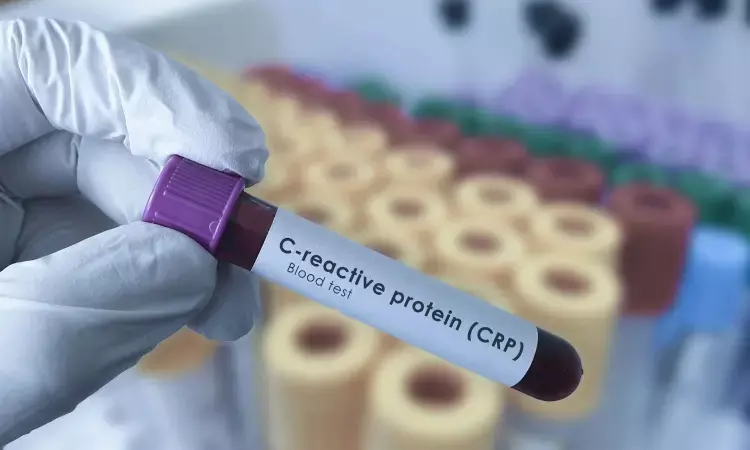- Home
- Medical news & Guidelines
- Anesthesiology
- Cardiology and CTVS
- Critical Care
- Dentistry
- Dermatology
- Diabetes and Endocrinology
- ENT
- Gastroenterology
- Medicine
- Nephrology
- Neurology
- Obstretics-Gynaecology
- Oncology
- Ophthalmology
- Orthopaedics
- Pediatrics-Neonatology
- Psychiatry
- Pulmonology
- Radiology
- Surgery
- Urology
- Laboratory Medicine
- Diet
- Nursing
- Paramedical
- Physiotherapy
- Health news
- Fact Check
- Bone Health Fact Check
- Brain Health Fact Check
- Cancer Related Fact Check
- Child Care Fact Check
- Dental and oral health fact check
- Diabetes and metabolic health fact check
- Diet and Nutrition Fact Check
- Eye and ENT Care Fact Check
- Fitness fact check
- Gut health fact check
- Heart health fact check
- Kidney health fact check
- Medical education fact check
- Men's health fact check
- Respiratory fact check
- Skin and hair care fact check
- Vaccine and Immunization fact check
- Women's health fact check
- AYUSH
- State News
- Andaman and Nicobar Islands
- Andhra Pradesh
- Arunachal Pradesh
- Assam
- Bihar
- Chandigarh
- Chattisgarh
- Dadra and Nagar Haveli
- Daman and Diu
- Delhi
- Goa
- Gujarat
- Haryana
- Himachal Pradesh
- Jammu & Kashmir
- Jharkhand
- Karnataka
- Kerala
- Ladakh
- Lakshadweep
- Madhya Pradesh
- Maharashtra
- Manipur
- Meghalaya
- Mizoram
- Nagaland
- Odisha
- Puducherry
- Punjab
- Rajasthan
- Sikkim
- Tamil Nadu
- Telangana
- Tripura
- Uttar Pradesh
- Uttrakhand
- West Bengal
- Medical Education
- Industry
Inflammation more strongly predicts adverse CV events and death than LDL-C in patients on statin therapy: Lancet

USA: A new meta-analysis shows that inflammation is a stronger predictor of future cardiovascular events and death for patients already on statins than LDLC cholesterol, indicating that adjuvant anti-inflammatory might provide more protection than additional lipid-lowering.
"Inflammation assessed by high-sensitivity CRP (hs-CRP) is more tightly linked to future adverse events than cholesterol assessed by LDLC," the researchers wrote. "These data have implications for selecting adjunctive treatments beyond statin therapy."
The researchers suggest that for further reduction of atherosclerotic risk, combined use of aggressive lipid-lowering and inflammation-inhibiting therapies might be required.
Together, researchers from three trials—REDUCE-IT, PROMINENT, and STRENGTH presented their findings at the American College of Cardiology/World Congress of Cardiology (ACC/WCC) 2023 meeting and subsequently published in The Lancet.
Hyperlipidaemia and inflammation contribute jointly to atherothrombotic disease. However, there might be a change in the relative contributions of hyperlipidaemia and inflammation to the risk of future cardiovascular when people are treated with intensive statin therapy. It has implications for choosing adjunctive cardiovascular therapeutics.
Against the above background, Prof Paul M Ridker, Brigham and Women's Hospital, Boston, MA, USA, and colleagues aimed to evaluate the relative importance of hs-CRP (high-sensitivity C-reactive protein) and LDL C (low-density lipoprotein cholesterol) as determinants for cardiovascular death, MACE (major adverse cardiovascular events) and all-cause death among patients receiving statins.
The investigators performed a collaborative analysis of patients at high risk of atherosclerotic disease receiving contemporary statins and participating in the multinational REDUCE-IT, PROMINENT or STRENGTH trials. Quantiles of increasing baseline hs-CRP and increasing baseline LDL C were assessed as predictors of future MACE, cardiovascular, and all-cause death.
Hazard ratios (HRs) were calculated for cardiovascular events and deaths across quartiles of LDLC and high-sensitivity CRP in analyses adjusted for gender, age, BMI, blood pressure, smoking status, randomized treatment group assignment, and previous history of CVD (cardiovascular disease).
The authors reported the following findings:
· The analysis from the three trials [PROMINENT (n=9988), STRENGTH (n=13 078), and REDUCE-IT (n=8179)] included 31 245 patients.
· In the three trials, the observed ranges for baseline hs-CRP and LDL cholesterol and the relationships of each biomarker to subsequent cardiovascular event rates were almost identical.
· Residual inflammatory risk was notably associated with incident MACE (highest high-sensitivity CRP quartile vs lowest high-sensitivity CRP quartile, adjusted HR 1·31), cardiovascular mortality (2·68), and all-cause mortality (2·42).
· The relationship of residual cholesterol risk was neutral for MACE (highest LDLC quartile vs lowest LDLC quartile, adjusted HR 1·07) and of low magnitude for cardiovascular death (1·27) and all-cause death (1·16).
"The findings indicate that combined use of inflammation-inhibiting and aggressive lipid-lowering therapies might be needed to reduce atherosclerotic risk further," the authors concluded.
Reference:
Ridker PM, Bhatt DL, Pradhan AD, Glynn RJ, MacFadyen JG, Nissen SE; PROMINENT, REDUCE-IT, and STRENGTH Investigators. Inflammation and cholesterol as predictors of cardiovascular events among patients receiving statin therapy: a collaborative analysis of three randomized trials. Lancet. 2023 Mar 3:S0140-6736(23)00215-5. doi: 10.1016/S0140-6736(23)00215-5. Epub ahead of print. PMID: 36893777.
Dr Kamal Kant Kohli-MBBS, DTCD- a chest specialist with more than 30 years of practice and a flair for writing clinical articles, Dr Kamal Kant Kohli joined Medical Dialogues as a Chief Editor of Medical News. Besides writing articles, as an editor, he proofreads and verifies all the medical content published on Medical Dialogues including those coming from journals, studies,medical conferences,guidelines etc. Email: drkohli@medicaldialogues.in. Contact no. 011-43720751


